Chekhcheran – The Journey to Chekhcheran
“This is not the place for humans. This is place for animals” – a driver from Chekhcheran
The one-eyed hotel owner of Garmao was a very good man. Not only he conducted body search (taloshi) for the passengers sleeping in his restaurant to find my lost harddisk, he also helped me to get a truck lift from Garmao to the provincial capital of Chekhcheran. There were only two trucks passing the lonely village that day, after I had been waiting for more than 24 hours. The owner, a slim, bearded man, was reluctant to take me. He quoted 400 Af price which was very expensive, as he said, he was afraid that Taliban would specially targeted foreigners. It was only an excuse. The hotel owner, with his big voice, insisted him to take me. He was very authoritative, even the truck owner was afraid of him.
Traveling by truck was far more interesting, comfortable, and cheap way of traversing the mountainous area of Afghanistan. It was slow. It broke often. The average speed was less than 7 km/hour. And it had comfortable seat. It was comfortable if you didn’t get the open air seat on the trading goods and had to depart as early as 3 a.m. when the weather was dangerously freezing.
Jaffar, the driver of the truck, was a friendly man. At first I was supposed to sit on the open carriage together with other hitch hikers, but then seeing me unable to climb, he allowed me to sit on the berth behind the drivers’ seat.
The village of Ghouk (literally, frog) was located a few kms from Garmao. This was a typical village of Ghour province. Poor and dusty. Here all trucks stopped, giving the machine a chance to take a breath before climbing the difficult passes of Ghouk and Gazzak.
The people of Ghouk was simple. Some old men came to me, curious about my glasses.
“Why you wear that?” said one of them pointing to my glasses.
“Without his I cant see anything,” I answered.
“Why so?”
“Because my eyes are broken.”
“Why your eyes are broken?”
“Because I read many books.”
“Don’t read books then. It’s dangerous for your health,” said the another old man gave a solution.
In Afghanistan, relation between men and women was limited. It was always a curious thing for them to know how to get a woman/wife in other countries. And a typical Afghan question came again to me in Ghouk, “how much a woman (=wife in Farsi) costs in your country?” It was then an understandable question after you knew that wife didn’t come by love but money. It was also very expensive. At least 4000 dollars to get a woman. With women so difficult to approach and buy, bacchabazi (play boy) became a solution.
The Kamaz truck climbed the Ghouk Pass with all its effort, as it almost exploded. The Gazzak Pass was more difficult for giant vehicles like this. The assistant boys had to get down the vehicle to show the way to the drivers and to clean the stones from the path. The truck had to stop often to cool down the machine. It was very dusty. After 2 hours full of sweat, the driver managed to reach the peak of the pass. The emotion was comparable to the mountain climbers reaching the peak of Everest. But these men experienced the hard track once a week.
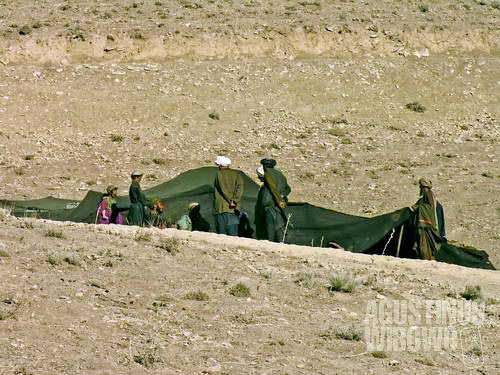
Camp of Kuchi (Afghan nomads) in the mountainous province of Ghouk. The Kuchi still preserve the nomadic culture and wander around the country throughout different seasons of the year.
The day was starting to be dark. Jaffar, the driver with beautiful blue eyes, drove the truck in darkness, until we arrived in the village of Burkhul at 10. This village was very dark, with only two samovars both packed by truck drivers, assistant boys, and truck passengers. The coaches didn’t stop here. We slept on the floor, packed, closed to each other. The driver told me that would depart at 5 the next morning.
The night was cold. They started the journey as early as 3 a.m. Afghans, either be too early or too late when they make appointment. The truck in which I was broke often, maybe after yesterday’s difficult climb at the passes. It broke at 6 when the sun just started rising. It was very cold outside. The men collected dry bushes from the hills to make fire.
“By the name of Prophet, this dying truck broke again!!!” swore Jaffar when the old truck broke at the second time. This happened at 9 in the poor village of Jar Sherwa, just one hour after we had breakfast in Turbulaq.
This time, the damage was serious. The drivers and mechanics worked very hard laying under the vehicle. It took hours. I was waiting by enjoying the scenery. The Ghor province with its hills, slopes, curves, had stunning view. “It’s very beautiful,” I said to Jaffar. Jaffar disagreed. “What beautiful? Life is so difficult here. No water, no road, no electricity. Nothing. Only barren hills here. This is not the place for humans. This is the place for animals.” This time a march of a dozen cows, navigated by a young shepherd, passed.
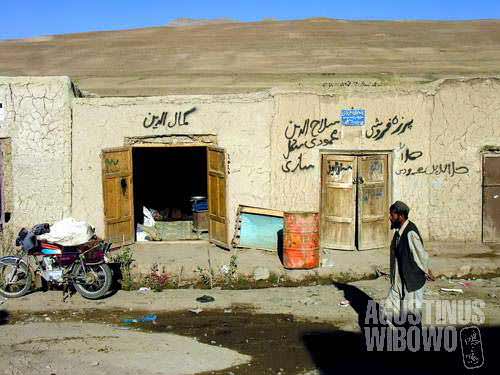
The village of Turbulaq, near Jar Sherwa, on the main road of the central route connecting Herat to Kabul. Despite of its strategic position, both of Turbulaq and Jar Sherwa remains isolated and undeveloped.
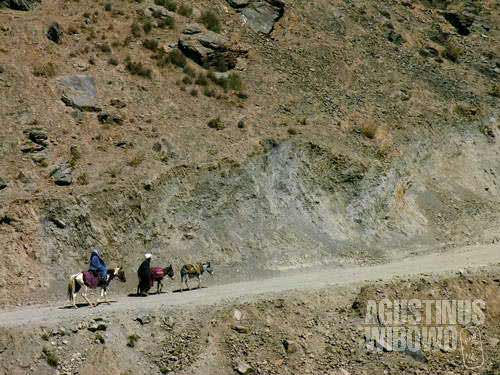
An Afghan couple from the poor province of Ghour travels on donkeys and horse. Traditional village women usually put on burqa veil when they travel, and generally women never travel far distant alone.
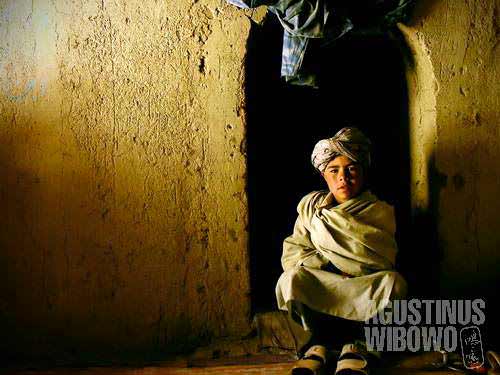
Generations after generations have passed, but it seems that time never flew at all in the poor province of Ghour in central Afghanistan. Ghour, due to its isolation in mountainous terrains, is now the least developed area in the country. Life has not changed for centuries here, including for this little boy, Mulla Sadidi.
Mulla Sadidi was not a mulla, like his name showed. He was just a boy of 8 years old from Jar Sherwa. He was studying in an madrassa there. And as most boys in the veillage, he was wearing a turban. “He will be a real mullah someday,” said his father proudly.
We had lunch in a samovar in the village. The samovar had nothing but tea and nan. Almost no vehicle stopped here, thus the economy of the village was not as good as those which became regular stops. It took 5 hours for the men to repair the broken truck, and at 2 we continued our journey.
“In the name of Allah,” I prayed when he started the machine. ” By the name of the Messenger,” this time I said when the truck broke again, just 40 minutes after the start. This time it was more serious than before. The day started to be dark and windy, but there was no sign that the journey would be continued. I was bored. I examined the care even until getting a priceless knowledge that this was a Japanese truck, with German machine, with 1 Iranian, 7 Indian, and 2 Thai tires, imported from a second hand car market in Dubai and purchased from Kabul.
The car died. The two drivers decided that the journey couldn’t be continued, and I went with the other truck to Chekhcheran. “We will be fast after Balan,” said the driver. But the speed was 2 km/h and after Balan it was increased to 6 km/hour. We arrived at the provincial capital at 9. The restaurants didn’t have any food, even no bread. Only tea. The policemen with guns came to check me, but then they urged the restaurant owner to assist me. “For humanity!” told the head of the policemen to the restaurant owner. The old man then managed to get a bread for my dinner and prepared a special place for me in the corner with special blanket among the tired truckdrivers in very crowded, dim-lighted restaurant hall.
I was tired in the 2 day journey to cover the 151 km distance. But the drivers were excited on watching the erotic scenes from Italian TV from the satellite.
Whatever. I slept soundlessly.

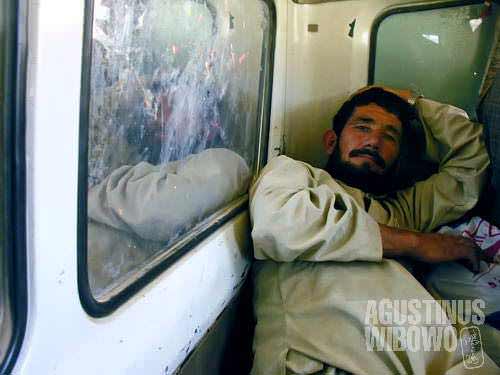
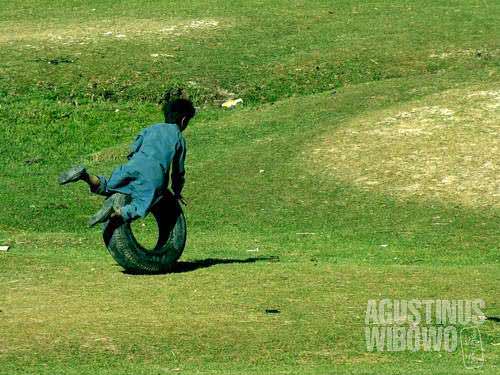
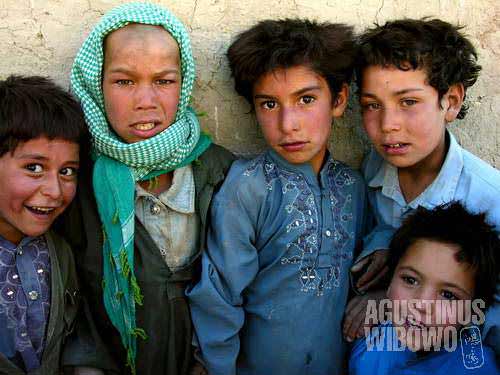
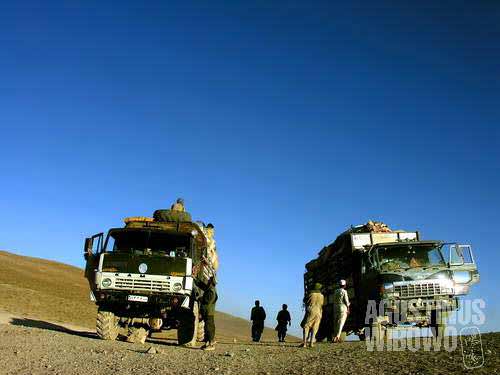
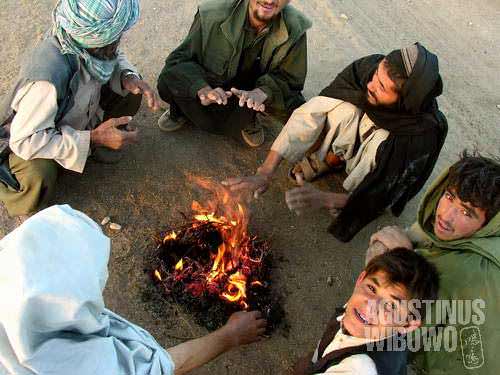
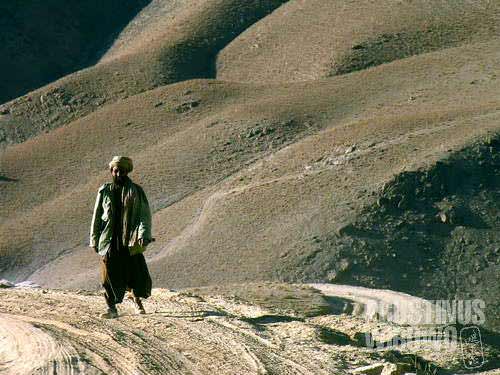
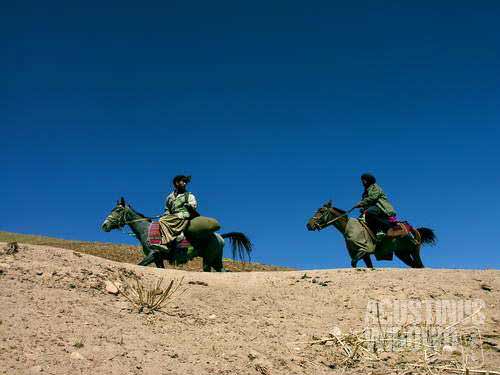
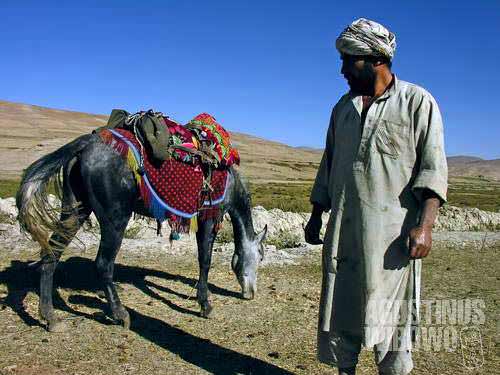
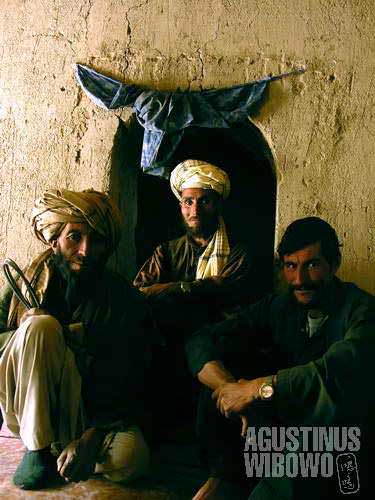

Leave a comment